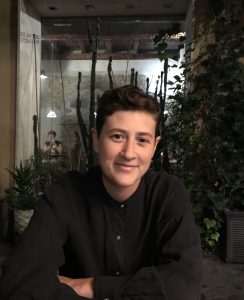Rachel Gelfand
Contact Information
410 Greenlaw Hall, CB 3520
University of North Carolina
Chapel Hill, NC 27599-3520
gelfand@live.unc.edu
http://www.rachelgelfand.com
Education
Ph.D., American Studies, University of North Carolina, Chapel Hill, North Carolina, 2018
M.A., American Studies, University of North Carolina, Chapel Hill, North Carolina, 2015
A.B., American Studies, Smith College, 2007
Research Interests and Honors
My scholarship engages with questions of queer relationality, intergenerational memory transmission, and historical method. I am interested in how oral history, archives, and visual objects carry and collect the past.
My current project, a book manuscript adapted from my dissertation, is an interdisciplinary and personal inquiry into the workings of intergenerational transmission of memory in the context of queer family. Studying visual art, oral history, and collaborative archival engagement, I utilize my family tree and an autobiographical approach to examine kinship, loss, home, Jewish experience, lesbian feminist history, and third generation Holocaust memory. The project contributes original research in LGBTQ historiography and complicates paradigms of generation in memory studies. Drawing on my experience as queer and the child of lesbian mothers with a known donor, the project uses queer bonds of biological and non-biological relation to disrupt existing notions of intergenerational memory. My dissertation research received support from the Schlesinger Library and Royster Fellowship. It was one of six projects short-listed in 2018 for the American Studies Association’s Ralph A. Gabriel Dissertation Prize.
I am also currently working on article-length projects on a collection of drawings by Palestinian artist Samia Halaby, the effects of FBI surveillance on Southern lesbian activism of the 1970s, the creative uses of the classified sections in gay newspapers of the 1980s, and a comparative study of two oral history interviews with the same movement activist (one from the early 1960s and one from the 2000s). This last project breaks down “oral history” as a stable or static entity and examines the role of digitized audio in the lives of those recorded.
Prior to graduate school, my work was in oral history and radio documentary. I continue to draw on skills in audio production in my scholarship and classroom teaching.
Courses Taught
AMST202: Historical Approaches to American Studies
HIST128: American History Since 1865 (Polk Correctional Institution, NCCIW)
AMST101: Introduction to American Studies
AMST290: Topics in American Studies
